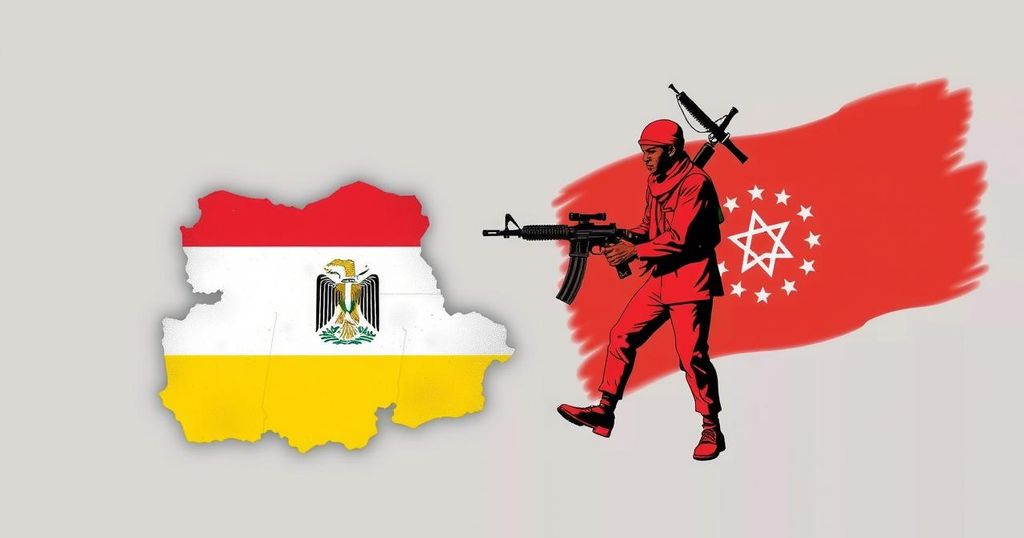The recent defense pact between Somalia and Egypt is straining relations with Ethiopia and complicating efforts against al-Shabaab. As tensions rise, the need for a cohesive military strategy becomes paramount. The EU and its partners must mediate to prevent a security crisis in the Horn of Africa arising from internal divisions and failing peace missions.
The recent military agreement between Somalia and Egypt has intensified tensions with Ethiopia, jeopardizing collaborative efforts aimed at combating al-Shabaab, the militant group that has persisted in its quest to destabilize Somalia. Following a mortar attack on an international military base in Mogadishu, attributed to al-Shabaab, the need for unity among Somalia’s diverse actors has become increasingly critical. Yet, the defense pact may further fracture relationships within the anti-terrorism coalition, potentially allowing al-Shabaab to regain territory and undermine security across the region. Somalia’s precarious situation is exacerbated by growing internal strife and a lack of cohesive military strategy. While the African Union Mission in Somalia (ATMIS) has made some progress against al-Shabaab since its inception in 2007, the upcoming mandate renewal is fraught with uncertainty over troop contributions and funding. With Ethiopia as the leading military force against al-Shabaab, the new Somali-Egyptian alliance jeopardizes existing frameworks, potentially paving the way for increased violence and instability, as both nations exhibit deepening animosities over territorial and sovereignty disputes. The implications of this geopolitical strife extend beyond Somalia, as the possibility of an inadequately supported ATMIS mission looms. Without a strong military presence, al-Shabaab may take advantage of the escalating power vacuum, destabilizing the region and increasing threats to Ethiopia’s borders. Moreover, this intra-nation discord undermines Somalia’s political stability by fracturing state and federal governance unity, and could result in a situation where Egyptian and Ethiopian troops operate in opposition, thereby further complicating an already delicate security environment. In response to these multifaceted challenges, European stakeholders must actively engage in mediatory efforts tailored to de-escalate tensions between Cairo and Addis Ababa. Given the substantial financial commitments made by European countries to support Somalia’s security initiatives, there is a pressing need for coordinated actions to provide a diplomatic framework that facilitates peace. Italy and the United Kingdom can lead such initiatives by fostering cooperative relationships with Turkey and the United Arab Emirates, as these nations possess vested interests in Somali stability and may offer crucial platforms for negotiations. In conclusion, the evolving dynamics in the Horn of Africa underscore the complexity of security governance in the region. The defense agreement between Somalia and Egypt poses significant risks to both Somali political unity and the operational effectiveness of international peacekeeping missions. Europe must leverage its substantial investments to guide mediation efforts, thereby preventing al-Shabaab and similar extremist entities from exploiting resulting discord. Immediate measures are essential to curtail a potential resurgence of violence that threatens regional stability in the Horn of Africa and beyond.
The ongoing tensions between Somalia, Egypt, and Ethiopia stem from various geopolitical issues, notably associated with the Grand Ethiopian Renaissance Dam and territorial disputes involving Somaliland. Somalia’s reliance on international support, particularly from the African Union (AU), has made its internal security situation precarious. Egypt’s military pact with Somalia is a response to these pressures but risks alienating Ethiopia, a key player in regional peacekeeping efforts. The situation highlights a culmination of historical grievances and evolving alliances that challenge peace-building initiatives in Somalia.
The defense agreement between Somalia and Egypt could severely disrupt efforts to combat al-Shabaab, exacerbating regional instability. The potential withdrawal of Ethiopian troops and the ensuing power vacuum could enhance al-Shabaab’s ability to expand its influence, endangering the delicate political fabric of Somalia and the broader Horn of Africa. Immediate and coordinated international diplomatic efforts, ideally led by the EU, Italy, and the UK, are vital to mediate tensions and preserve both Somali sovereignty and regional stability.
Original Source: ecfr.eu






